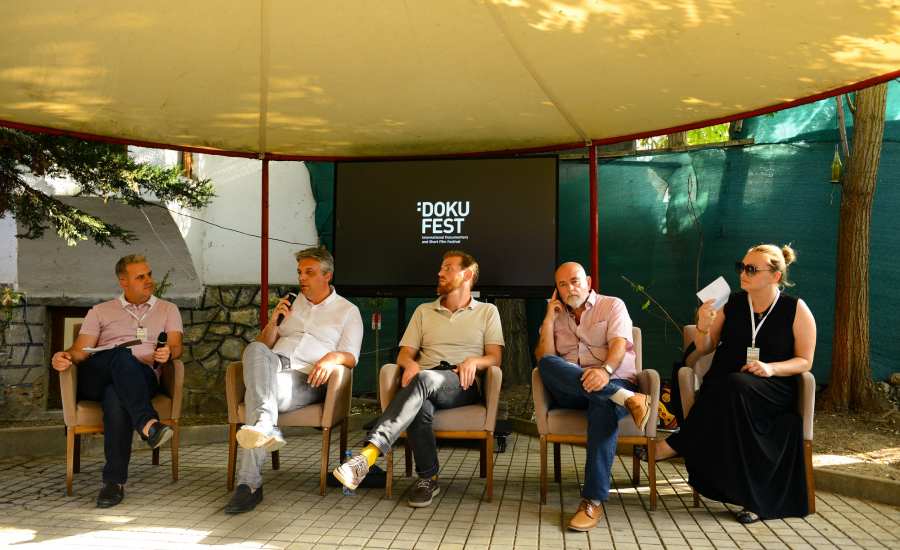11/08/2021
Re: Act for Environment panel urged the necessity to do more and faster in order to salvage the environment for a better future.
Now it is time to react, said all the speakers at Shani Efendi in Prizren, in a talk discussing environmental issues. During this week all the attendees felt the high temperature in the afternoon in the city, while during the talk the moderator Visar Azemi, the executive director of Balkan Green Foundation, mentioned the obvious fact that we are now experiencing the repercussions of global warming. He also spoke about the need to educate everyone and making it basilary.
Nita Luci, Granit Gashi, Adriatik Bytyqi, Nebojsa Redzic spoke about the main issues and where their activism and action rely on to do better for the environment in Kosovo.
Adriatik Bytyqi’s contribution in reacting for the environment has its bases in recycling glass. The usage and glass waste has been and is a huge problem in the world but also in Kosovo and Bytyqi’s take is a good way to reuse it again.
His work with Tiki Mosaic started in 2015 and he says: ‘’We collected the glass and respectively the residues and tossed away glass which were used to build windows. Our equip collected the glass from all Kosovo. And in a way we are trying to manage to not to impact in polluting the environments because glass is problematic to recycle. For it to be fully recycled in an open space it takes 1 million years. So, we are trying to collect in our depos and from there we are selecting glass, than transform it through heat and from then we create mosaics of different forms. While doing these mosaics we are trying to redesign and creating a palette which our staffs of designers has created different styling to be used in different places in hotels, pools, cafeterias, etc.”
He goes on about the need for building up support internationally.
“We have now tried to expand internationally to Greece, Germany, Serbia, Croatia, Hungary but we need the support of local and national authorities to expand our work. We can only work with 5% of the wasted glass and making it accessible and recyclable, costs a lot”, says Bytyqi
Granit Gashi talks more about his work as an activist: “The case in Mitrovica proved that a lot of people are aware of the environmental issue but there is a lot of work to do. We are witnessing development in the private sector which are trying to reuse and support the environmental issue. We have created a critical mass which is keen on addressing these problems which are facing.
Lately Sharri has been a heated argument about the water which has been taken from the locals to build hydro centrals. But it has sparked a lot of debates. Sharri now is a delicate issue and the people living there face the restrictions of water. Nebojsa has been one of the clearest voices against this act.
Nebojsa Redzic said: “What has happened there is no picnic, what has happened in the mountains of Sharri is a pure destruction of the environment. There is a lack of planification, no accountability and no financial value can replace the harm done there. There is an untruthful stance from local and national authorities regarding this issue. People seek personal profits and if we analyse the investments done for personal gaining. We have understood the touristic approach and investments done there, but this we cannot bare to understand.”
While speaking about the Sharri situation he compares it to the previous scenery and claims the situations has gotten worse.
“It was not possible before to not see water in Sharri but now it looks like a wasteland. There is no drinkable water. People have reacted strongly through protests, petitions, sending letters to authorities and speaking to those in power. We are tired of double standards; we see many international companies working here in Kosovo which do not respect the same regulations they respect in their countries. This must stop,” says Redzic.
Nita Luci, professor in University of Prishtina was part of this panel and brought an academic and anthropological approach to the matter.
She says: “There is a research mostly as understanding nature as an expression of an older tradition which gets often romanticized, or engineers which try to treat this issue form a technical perspective. We must understand the main issues regarding the environment in Kosovo and pinpointing to our main battles. We have accompanied many activists inspired for motion around the world. Now we are doing a research which is historical in a sense but also modern in the activism context.”
She shared some of the main arguments we discovered in this research:
“Social and capitalistic systems have the same approach to nature. States like ex-Yugoslavia or Hungary have treated it alike. In the cold War, big infrastructural projects have been part of the political game. This concept of mis XX century, in the way it has internalized modernity is not different from what neoliberals do.
Then Luci offered some insight on how to act better for the environment and the urgency of the matter.
“I think that the solutions which will make consummators responsible is not only not taking plastic bags because that is the same as curing symptoms, but we also need to treat the root of this problem, like for example how can we face this growth by 1.5 Celsius raise in temperature,” said Luci.
All of us can play a part on saving the environment and easing our struggle but we need to discuss directly not only how the general population can act, but also building policies to follow up.
The end of the conversation at Shani Efendi, organized in collaboration with Balkan Green Foundation ended by invited everyone to think more before they act. Time is running and our planet needs immediate solutions.



